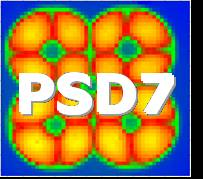Speaker
Dr
Anna Macchiolo
(INFN Firenze and Università di Firenze, Italy)
Description
We report on the processing and characterization of micro-strip
sensors produced on n- and p-type Czochralski silicon. The aim of
this work is the development of radiation hard detectors for very
high luminosity colliders. The activity is funded by INFN within
the SMART project in the framework of the RD50 Collaboration.
The devices have been produced by ITC-IRST on 4” wafers, together
with test-structures to monitor the process parameters and to study
the modification of the bulk and of the surface properties as a
function of the received fluence. Each wafer hosts ten mini-sensors
with different strip geometries in order to compare the detector
performances while varying the widths of the strip p+ implantation
and of the metal layer.
The detectors have undergone two irradiation campaigns using 24
GeV/c protons at CERN and 26 MeV/C protons in Karlsruhe up to
fluences of 5.0x1015 cm-2 and 1.6 x1015 cm-2 respectively.
The mini-sensors have been characterized before and after
irradiation by measuring the IV and CV characteristics, the inter-
strip capacitance and with scans of the strip currents.
Their performances have been compared with those of detectors of
the same design processed on standard Fz silicon. Their relative
radiation hardness has been established in terms of the depletion
and breakdown voltages and by studying the inter-strip capacitance.
The preliminary outcomes of these measurements are discussed.
Primary author
Dr
Anna Macchiolo
(INFN Firenze and Università di Firenze, Italy)




